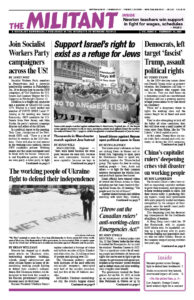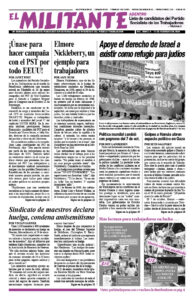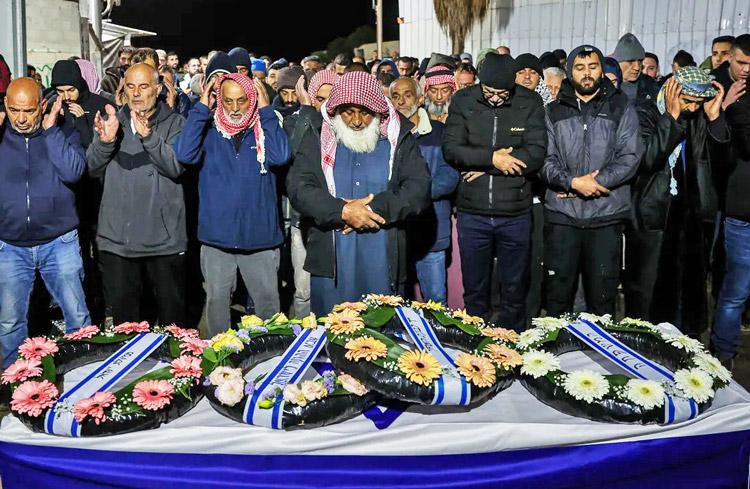The Israeli army’s advances in Gaza are striking blows to Hamas and its brutal rule, beginning to open space for Palestinians there to speak out, including against the Tehran-backed group. This opens the door to uniting working people — Jews, Arabs and others — to fight for their common interests throughout the Middle East, and push back against Jew-hatred.
Israeli officials have released videos of several anti-Hamas actions in Gaza, including one that shows hundreds fleeing Khan Younis Jan. 26 chanting, “The people want the fall of Hamas!”
Another showed women and children marching with white flags, chanting, “No Netanyahu and [Hamas leader Yahya] Sinwar — enough with destruction and war!” Open criticism of Sinwar is rare because unlike many other Hamas leaders he lives in Gaza.
On Oct. 7 Hamas — trained, financed and armed by Tehran — carried out the worst massacre of Jews since the Holocaust, killing 1,200 people, mostly civilians, wounding more than 5,000, taking 240 hostages, raping women and mutilating many of its victims.
The reactionary Islamist death squads also killed dozens of Arab, Thai, Nepali, Filipino and African workers for the “crime” of working with Jews in Israel. Hamas still holds more than 100 hostages, who face torture and sexual abuse.
The pogrom put some wind in the sail of Jew-haters around the world, especially middle-class leftists and Stalinists who lead demonstrations demanding a permanent cease-fire that would leave Hamas intact. But it’s also made it easier for working people around the world to see Hamas for what it is, a tool of the reactionary regime in Tehran and an organization whose program is to kill Jews and try to destroy Israel.
Arab, Jewish workers oppose Hamas
Most workers in Israel — Jewish and Arab alike — were horrified by the Oct. 7 massacre by Hamas, Yaniv Bar Ilan, a spokesperson for the Koach LaOvdim (Power to the Workers) trade union federation, told the Militant by phone Jan. 28.
Some Arab bus drivers in the union call Oct. 7 “that black day,” Bar Ilan noted. It upsets them when some Jewish passengers accuse them of being Hamas supporters.
To combat divisions among workers, the union put out a video in Hebrew featuring the deep friendship and discussions between a female Orthodox Jewish bus driver and her Bedouin Arab co-worker, who had relatives taken hostage by Hamas.
“As a trade union that organizes both Jews and Arabs, we are of course concerned about the welfare of working people in Gaza as well,” he said. “We can understand why some people call for a cease-fire, but not those who refuse to acknowledge what Hamas carried out Oct. 7 or who claim that Israel is committing genocide.”
Resistance to Hamas in Gaza “helps people see that the citizens in Gaza don’t support what happened Oct. 7,” Bar Ilan said.
At least 26 Bedouin Arab citizens of Israel were murdered Oct. 7; 19 by Hamas death squads at kibbutzim where they worked and seven by Hamas rockets. Many Bedouin risked their lives to help rescue people under attack that day.
Some 100,000 Bedouin live in “unrecognized” villages in the Negev that lack electricity, running water, paved roads and schools. Even in the recognized villages, where 400,000 live, there are few shelters to protect against Hamas rockets.
On Jan. 21, a six-person delegation from the Knesset, Israel’s parliament, made what the Jerusalem Post called an “unprecedented visit” to unrecognized villages to see what workers there face firsthand. It included members of Likud, the party of Israeli Prime Minister Benjamin Netanyahu, and Shas, an ultra-orthodox Jewish religious party.
With the exception of Arabic-speaking Druze, other Arab citizens of Israel are exempt from the draft. But many Bedouin volunteer to serve in the Israel Defense Forces. Some 20% of Israel’s people are Arabs.
Sgt. 1st Class Ahmad Abu Latif, a Bedouin from Rahat, died fighting in Gaza Jan. 22. “The younger generation is showing us that we have to work together, Jews and Arabs, because we are threatened by a common enemy,” his brother, Kaid Abu Latif, said at the funeral. “Ahmad was proud to be Muslim, Bedouin and Israeli in equal measure.”
International Court’s initial ruling
On Jan. 26, the International Court of Justice in The Hague issued a provisional ruling in response to charges brought by the Stalinist-trained South African government that Israel is committing “genocide” in Gaza.
The Israeli government asked the court to throw out the charges, noting that “if there have been acts that may be characterized as genocidal,” it’s what Hamas and its death squads carried out Oct. 7. The court has no power to enforce its decisions.
Even though the court is stacked against Israel, the ruling fell way short of what the South African government, Hamas and its allies had hoped for. The court ruled the case would continue and instructed Israel to refrain from carrying out any acts of genocide in Gaza in the future. To try to cover up its anti-Israel bias, it included one sentence calling for the “unconditional release” of the hostages held by Hamas. And it did not call for a cease-fire.
One judge, Julia Sebutinde, voted against accepting the charges. She is the first African woman to serve on the 17-member body.
In her dissent Sebutinde said, “The war was not started by Israel but rather by Hamas.” Israel has attacked “legitimate military targets in Gaza,” and has “emphasized that its war is not against the Palestinian people as such, but rather is against Hamas.”
The scale of the deaths in Gaza is in part a result of Hamas “embedding” its forces among the civilian population, she notes.
In a slap in the face to the South African government, she points out that it enjoys a “cordial relationship with the leadership of Hamas.” They should “use whatever influence they might wield, to try and persuade Hamas to immediately and unconditionally release the remaining hostages.”
On Jan. 28 the U.N. fired at least nine employees of its Relief and Works Agency in Gaza — a body set up to administer aid to Palestinian refugees — after it was revealed that they directly participated in the Oct. 7 pogrom.
One kidnapped and held a hostage. Another handed out ammunition. A third joined the massacre of civilians at a kibbutz.
The UNRWA is the only U.N. agency dedicated to a specific group of refugees. Instead of pushing for Palestinian refugees to be integrated into the countries where they live with the right to a job, the agency has helped keep them dependent on handouts. And now it’s clearer than ever, it’s been complicit with the course pursued by Hamas.


